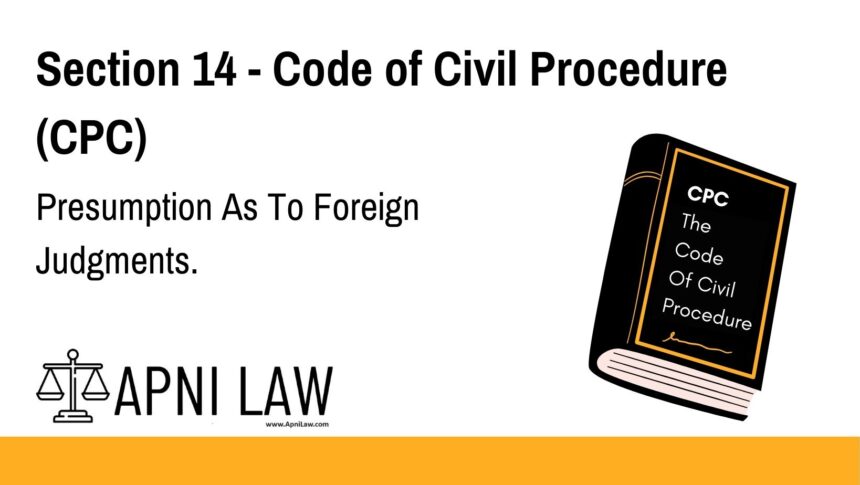Code
The Court shall presume upon the production of any document purporting to be a certified copy of a foreign judgment, that such judgment was pronounced by a Court of competent jurisdiction, unless the contrary appears on the record; but such presumption may be displaced by proving want of jurisdiction.
Explanation of Section 14 CPC
Section 14 of the Code of Civil Procedure deals with the legal presumption attached to foreign judgments. When a certified copy of a foreign judgment is produced in an Indian court, the court will presume that it was delivered by a court of competent jurisdiction. This is known as a rebuttable presumption.
This means the burden of proof initially rests on the person objecting to the foreign judgment. The Indian court assumes the foreign court had jurisdiction unless the opposing party can provide evidence that the foreign court lacked jurisdiction.
This provision supports judicial comity and smoothens the process of enforcing foreign judgments in India while still preserving the right to contest jurisdiction.
Relation with Section 13: Section 14 complements Section 13 CPC. While Section 13 lays out when a foreign judgment is not conclusive, Section 14 lays down the initial presumption in favor of its validity.
Key Takeaways:
- The presumption is only about jurisdiction—not about the merits of the judgment.
- It is rebuttable. If the judgment is from a court that clearly lacked jurisdiction, the Indian court can refuse to accept it.
- The judgment must be a certified copy—mere uncertified copies do not carry this presumption.
Illustration of Section 14 CPC
Example:
A certified copy of a judgment from a court in France is submitted in an Indian civil case concerning inheritance. The Indian court will presume that the French court had jurisdiction over the matter. However, if the opposing party proves that the person against whom the judgment was passed was never a resident of France and had no connection with that jurisdiction, the presumption will be rebutted, and the judgment will not be accepted.
Another example:
An NRI submits a certified copy of a divorce decree obtained from a U.S. court in an Indian family court proceeding. The court will initially presume that the U.S. court had jurisdiction. But if it is later shown that the parties were not domiciled in the U.S. and the decree was passed ex parte without notice to the other party, the presumption may be displaced.
Common Questions Asked
Q1. What does “presumption of jurisdiction” mean under Section 14?
It means that the Indian court will accept, at face value, that the foreign court which issued the judgment had the legal authority to do so—unless proven otherwise.
Q2. Can this presumption be challenged?
Yes. This is a rebuttable presumption. If the party against whom the foreign judgment is being enforced can prove that the foreign court lacked jurisdiction, the Indian court can set aside the presumption.
Q3. Is this presumption applicable to all foreign judgments?
No. The presumption only applies when a certified copy of the foreign judgment is submitted. Uncertified or informal copies of foreign judgments are not entitled to this presumption.
Q4. What type of evidence can rebut the presumption?
- Proof that the defendant was not present in the foreign country
- No summons was served
- The defendant had no connection (residence, property, contract) with the foreign country
- The foreign court’s jurisdiction was contrary to the Indian legal understanding of jurisdiction
Q5. How does this relate to Section 13 CPC?
Section 13 outlines when a foreign judgment is not conclusive in India (e.g., fraud, violation of natural justice). Section 14 deals with the procedural presumption of jurisdiction unless rebutted.








